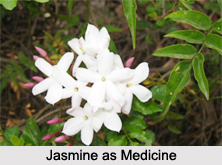 Jasmine contains a wide range of medicinal properties that makes it useful in varieties of health problems including eye disease, heart problem, migraine, cough, cold, skin problems, oral infections, ear infection and dental problems. The fragrant flowers of Jasminum grandiflorum are used for preparing a scented oil, which is considered cooling, and is much used by the richer natives for anointing their bodies before bathing. The leaves of this plant are used medicinally in skin diseases, ulcers in the mouth, otorrhoea, etc. and enter into the composition of numerous prescriptions for these diseases.
Jasmine contains a wide range of medicinal properties that makes it useful in varieties of health problems including eye disease, heart problem, migraine, cough, cold, skin problems, oral infections, ear infection and dental problems. The fragrant flowers of Jasminum grandiflorum are used for preparing a scented oil, which is considered cooling, and is much used by the richer natives for anointing their bodies before bathing. The leaves of this plant are used medicinally in skin diseases, ulcers in the mouth, otorrhoea, etc. and enter into the composition of numerous prescriptions for these diseases.
Dose of Jasmine in Medicine
The fresh juice of the leaves is applied to soft corns between the toes. In ulcerations or eruptions in the mucous membrane of the mouth, the leaves are recommended to be chewed. An oil prepared with the juice of the leaves is poured into the ear in
Otorrhoea.
This article is a stub. You can enrich by adding more information to it. Send your Write Up to content@indianetzone.com
Related Articles
Ayurveda
Origin of Ayurveda
Ayurveda Medication
Elements of Ayurveda
Concepts of Ayurveda
Ancient Literature of Ayurveda
Sushruta Samhita




















